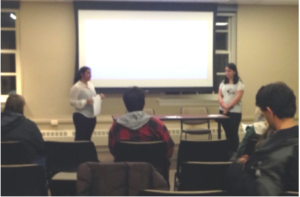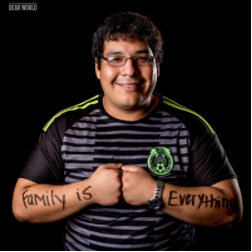By Ishita Aghi and Erika Gallagher

At UW-Madison, the Undergraduate Writing Fellows program is composed of 50 students who assist other undergraduates with academic writing in courses across the College of Letters & Science. Fellows are undergraduate tutors from a variety of disciplines who possess a passion for helping others. They undergo extensive training and ongoing education, complete their own original research, and work directly with professors to help their students become better writers.
As Undergraduate Directors for the Writing Fellows program, we have experienced the joys of learning and collaborating as new Writing Fellows. All new Writing Fellows complete a writing-intensive training course, English 403: Tutoring Writing Across the Curriculum, in which they read extensively from the field of writing studies, participate in lively discussions, and conduct original research about writing and/or tutoring writing. In addition, during their first semester in the Program, they begin the work of a Writing Fellow, assisting 8-15 students with drafts of two different papers over the course of the semester. They do all of this while being full-time students themselves. Serving as a Writing Fellow can be challenging: Fellows must manage a hectic schedule of commenting and holding individual conferences with students and communicating regularly with course professors.

Each year yields a new cohort of dedicated new Fellows who take on the challenges and responsibilities associated with peer tutoring. We are very lucky to have a new group of Fellows this year up to the challenge of tackling these responsibilities. Ranging from sophomores to fifth-year students, our new Writing Fellows come from all over the US, including Illinois, Minnesota, Tennessee, and, of course, Wisconsin. The new Fellows study a variety of subjects such as: Communication Arts, Community and Environmental Sociology, English, International Studies, Kinesiology, Life Science Communication, Pharmacology and Toxicology, and Philosophy. Not only do the new Fellows have various academic backgrounds, they also have varying perspectives about what the Writing Fellow program has taught them in the short time they’ve been involved.
To better understand these perspectives, we distributed an online survey to new Fellows, asking about their experiences with the Program. In their responses, new Fellows demonstrated that they’ve already gained new insights into the writing process: they enjoy collaborating with peers, realizing the power that words hold, and recognizing that writing can be both liberating and oppressive. Fellows also praise the strong sense of community they feel within the program, particularly while taking English 403, and they enjoy working with a variety of students while growing as writers themselves. One Fellow highlighted, “I think the most valuable thing I’ve learned so far is to understand that I myself am always learning, and viewing that as a positive opportunity for growth.”

One new Fellow, Jesús Galvan, eagerly expressed his positive experiences in the Program. Originally from Belvidere, IL, Galvan, a 5th year Kinesiology student with certificates in Latin@ and Chican@ Studies and Global Health, became interested in the Writing Fellows Program through his positive experiences visiting the Writing Center. As a Fellow, Jesús has learned to prioritize organization and help students break down a prompt to see if their writing serves its intended purpose. He finds his biggest (and best) challenge to be the research project in English 403 and writing time-consuming marginal comments on drafts of student papers. Jesus is passionate about helping others–he is currently applying to two AmeriCorps programs and to be a Fulbright Teaching Assistant in Mexico to further his goals as an educator and advocate for students. In the future, he hopes to continue working collaboratively with students to ensure their educational equity. In this work, he has found it helpful to draw upon the Writing Center’s feminist pedagogical training and other Fellow research projects on inclusivity and empowerment. Jesús notes, as a Badger, that “getting accepted into this position has solidified my overall growth as a writer while in college, and has added yet another dimension into my rich, well-rounded Wisconsin Experience.”
As another new Fellow noted on our survey, writing brings people together by allowing us to “cultivate our writing skills and make connections with students.” Many wrote that they love meeting their students and collaborating with other undergraduates, Fellows, graduate students, and faculty alike. In the words of one Fellow, “[I enjoy] thinking about the intentional and unintentional power of my words to help, to harm, and to connect with others.” The Writing Fellows program is rife with opportunities for every undergraduate as it focuses on supporting all students involved: tutor, tutee, and, of course, the student researcher. From English 403 to staff meetings to ongoing education sessions, Fellows are always collaborating and growing alongside their peers, pushing the boundaries of writing education as they are exposed to more people, more voices, more dialects, more research, and endless opportunities.
We can only offer words of praise in our comments about this program (as we learned in our seminar class, praise is key for growth and positive learning outcomes). We are so lucky to have new fellows who are compassionate, kind, intelligent, mindful, wonderful students and people who are helping to lead campus toward a “writer” future.


Thanks Ishita and Erika for this thoughtful, and for those of us who have been around, perennially favorite account of one of Wisconsin’s finest institutions: the Writing Fellows Program. I’ve heard UW-Madison Writing Center alumni, now Directors at different institutions, describe their process for working with and selecting their Writing Center instructors, and often how these Directors worked with the Writing Fellows in the various capacities made possible at UW-Madison: it is clear that they have benefited by this previous work. And I appreciate hearing how this institution is still valued strongly today at UW-Madison for its contributions to promoting a mindful community of writers and a robust culture of writing, just as it has been in the past. In this post, we read of how the Writing Fellows Program succeeds through fostering a sense of community, making growth opportunities possible, and by allowing and teaching students to see connections across habits of mind and disciplinary perspectives through writing, and through a recognition of the hard work that makes writing worth all that we devote to it: process, product, project, production, and purpose. The work of the Writing Fellows provides a tangible benefit to educational experiences of many UW-Madison students: this work can be accounted for, assessed, and appreciated in many demonstrable ways. In a world where educational institutions are just as likely to be challenged with inconsistent reasoning and reasons not consistent with the good values that support a strong culture of teaching and learning writing, I am very grateful to hear that the Writing Fellows Program is ever making mindful progress, bringing forth new Fellows, and that the culture of writing at UW-Madison continues to be better off every year because of the Writing Fellows Program and the Writing Fellows who are the very heart and soul of this Program.
Christopher J. Syrnyk
Past UW-Madison Writing Center Instructor
Associate Professor of Communication
Director, Oregon Tech Honors Program
Oregon Tech
Klamath Falls, Oregon
Thanks for sharing, Ishida and Erika! What a beautifully written testimonial to the program. It has been a privilege to work with Jesús and other talented Writing Fellows as a mentor this semester. It’s also been inspiring to see how many Fellows are incorporating social justice pedagogies into their tutoring and research. Being asked to reflect upon these things by all of you has been an important part of my thinking this semester. I look forward to seeing the Fellows present these projects in the spring!